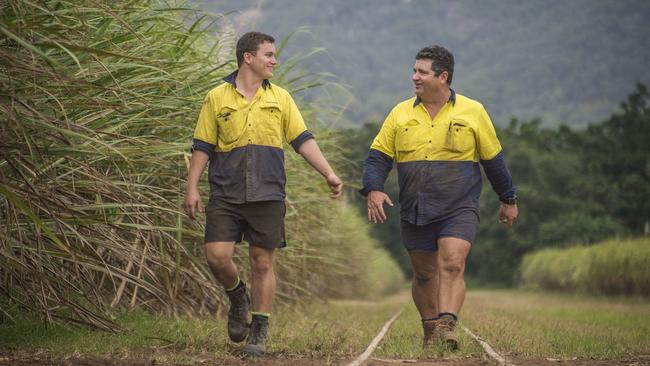Aussies sense an opening as UK slams door on Europe
How sweet it will be for the Hesp family if Brexit opens the way for Australian sugar to return to Britain.

How sweet it will be for the Hesp family if Brexit opens the way for Australian sugar to return to the supermarket shelves of Britain after all these years.
Talks between Malcolm Turnbull and British Prime Minister Theresa May have fired hopes of a new trade agreement to deal Australian farmers back into the market they lost in 1973 when Britain joined the then European Economic Community, forerunner of the EU.
At the time, Richard Hesp’s father, Jim, was growing sugarcane outside Gordonvale in north Queensland and, as with primary producers across Australia, life got that much tougher for the family. “It was definitely a blow,” Richard Hesp said after Mr Turnbull pitched to Mrs May a free-trade agreement once Britain left the EU. “When you lose a stable market like that … everyone feels it.”
Previously, Britain had taken up to a third of Australian agricultural exports. The sugar industry built a new customer base as Australian producers shifted focus from the “old country” to emerging opportunities in Asia.
Most of the crop Mr Hesp is raising with his 22-year-old son Hayden — a fifth-generation cane farmer — will be exported to Japan, South Korea, Indonesia and, increasingly, China.
A generation ago, Australian dairy farmers sent 55,000 tonnes of butter a year to Britain and 10,000 tonnes of cheese. Last year, the value of dairy exports to the EU barely nudged $19 million — a drop in the milk bucket compared to the $600m clocked up with China. Apple growers who were crunched in 1973 found replacement markets in New Zealand, Indonesia and Canada; beef producers looked to the US and Japan.
National Farmers Federation chief executive Tony Mahar said only 1.5 per cent of Australian agricultural exports now go to Britain, the rest locked out by EU tariffs or priced out by hefty subsidies paid to European farmers. Wine, beef and lamb are mainstays of the trade now.
But Australian producers have never given up on the lucrative British market and the ice-breaking discussion between Mr Turnbull and Mrs May on the sidelines of the G20 summit were encouraging. “We are certainly looking at it as an opportunity, but we are realistic about our expectations,” Mr Mahar said.
Deputy Prime Minister Barnaby Joyce talked up the potential of a post-Brexit trade deal, telling The Australian: “In the 1970s Britain, from an agricultural perspective, disappeared overnight, and overnight they are back again. This is a vitally important opportunity for both our countries.”
While Mr Turnbull said Australia was “getting in … early” it would take the British years to untangle from the EU. Mrs May insisted in Hangzhou the success of Brexit would be measured in part by new bilateral trade agreements.
Mr Mahar said the deal with Britain would be nutted out as Australia negotiated a separate FTA with the EU. Much would depend on whether British farmers kept their EU benefits, as pledged by the May government, or if the Europeans retaliated by imposing new tariffs.
Canegrowers Australia’s head of economics Warren Male said the sugar industry hoped to boost sales to Britain from a “teaspoonful” to about 150,000 tonnes a year through an FTA. Before 1973, a third of Australian sugar exports went there.
Charlie McElhone, of Dairy Australia, said closure of the British market had created problems that cascaded through the sector. “We still refer to it today as one of the most disruptive times we have had,” he said.
Cattle Council chief executive Jed Matz said Australia currently sold about 30,000 tonnes annually to the EU, most of it in top-shelf cuts. About half the quota imposed by the Europeans was shipped to Britain. “We are looking to the future,” Mr Matz said.
The EU tariff added up to 23c to the average $9 retail price of a bottle of wine in Britain, the Australian Grape and Wine Authority reported last year.
At the family cane farm 40 minutes’ drive south of Cairns, Richard Hesp said the Europeans had been dumping subsidised beet sugar on the world market for years and Australian growers were keen to even the score by regaining market share in Britain.
“Having another stable customer would be a real bonus in terms of increasing the competition to support the sugar price,” said Mr Hesp, 50.
Son Hayden chimed in: “Any opportunity is better than none.”




To join the conversation, please log in. Don't have an account? Register
Join the conversation, you are commenting as Logout